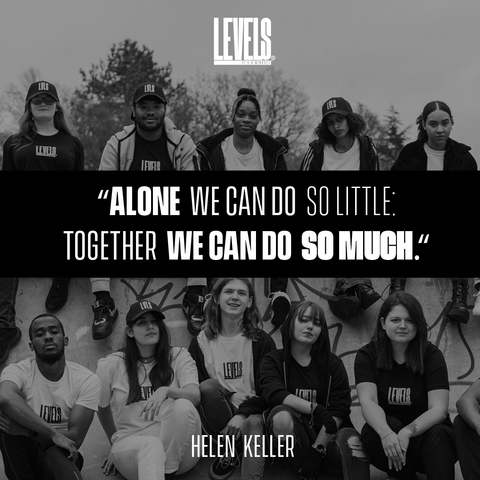
The Benefits of Being in a Group
Why Joining a Team Matters
Being part of a group is a transformative experience that goes beyond the ordinary. The sense of belonging, shared identity, and emotional support that groups provide fulfill the fundamental human need for social connection. Being in a group can also help individuals develop social skills, communication skills, and leadership skills. Teamwork is an essential aspect of being in a group. When individuals come together and strive towards a common goal, they can achieve more than what they could have accomplished alone. Working in a group can also help individuals learn how to manage conflicts, build trust, and develop problem-solving skills. In this comprehensive exploration, we delve into the myriad benefits of being in a group, emphasising the importance of teamwork, diverse perspectives, and collective responsibility.
Explore Levels Learning and Levels Recruitment:
Joining a group can be important for individuals who want to learn new skills or gain knowledge in a particular area. Groups provide a platform for individuals to share ideas, collaborate, and learn from one another. Being in a group can also provide opportunities for individuals to network and make connections with others who share similar interests or career goals. Under our Levels Group umbrella, we have Levels Learning for knowledge and skill acquisition and Levels Recruitment for career advancement. Our Levels Group, has possibilities for learning, growth, and project success abound.
The Concept of Group Dynamics
Group dynamics refer to the study of how individuals interact with each other in a group setting. It is the way in which people in a group behave, communicate, and influence each other. Group dynamics can be seen in any group, whether it is a small family unit or a large corporation. The concept of group dynamics is important because it helps to understand how groups function, how they can be effective, and how they can be improved. It can also help to identify the roles that individuals play within a group and how these roles can affect the group’s overall performance
Historical Perspectives
The study of group dynamics has a long history, dating back to the early 20th century. The first researchers to study group dynamics were social psychologists who were interested in understanding how groups of people interacted with each other. One of the earliest studies of group dynamics was conducted by Kurt Lewin in the 1940s. Lewin was interested in understanding how groups of people made decisions. He found that groups tend to make decisions that are more extreme than the decisions made by individuals. This phenomenon is known as group polarisation. Another important concept in group dynamics is social loafing. This occurs when individuals in a group do not put in as much effort as they would if they were working alone. Social loafing can be a problem in groups, as it can lead to a decrease in group performance.
Psychological Benefits of Group Membership
Sense of Belonging
Being part of a group provides a sense of belonging and acceptance, which helps to fulfill a basic human need for social connection. People who feel connected to others are more likely to have higher levels of happiness, life satisfaction, and overall well-being. This sense of belonging can also lead to increased motivation and engagement in group activities.
Shared Identity
Joining a group allows individuals to develop a shared identity with others who have similar interests, beliefs, or goals. This shared identity can help to provide a sense of purpose and meaning, as well as a feeling of being part of something larger than oneself. This can lead to increased self-esteem and a greater sense of personal growth and development. Joining Levels Group is an invitation to develop a shared identity, fostering personal growth and self-esteem. The community provides a purpose beyond oneself, leading to increased motivation and a greater sense of accomplishment as individuals identify with the collective vision.
Emotional Support
Being part of a group can also provide emotional support during difficult times. Group members can offer empathy, understanding, and encouragement to one another, which can help to reduce stress and improve overall mental health. This emotional support can also help individuals to develop stronger coping skills and resilience in the face of adversity.

Diverse Perspectives
Being in a group brings together individuals with diverse backgrounds, experiences, and perspectives. This diversity allows for a wider range of ideas and approaches to problem-solving. When individuals with different perspectives work together, they can identify blind spots and biases that may hinder progress. By incorporating multiple perspectives, a group can come up with more creative and innovative solutions.
Synergy in Problem-Solving
When individuals work together in a group, they can combine their strengths and skills to achieve a common goal. This synergy allows for a more effective problem-solving process. By pooling their resources, a group can tackle complex problems that may be too challenging for an individual to solve alone. Additionally, group members can provide support and encouragement to each other, which can boost morale and motivation.
Innovation Through Collaboration
Collaboration is essential for innovation. When individuals work together in a group, they can share their ideas and build upon each other’s contributions. This collaborative process can lead to breakthroughs and new discoveries. By fostering an environment of open communication and mutual respect, a group can encourage innovation and creativity.
Learning and Personal Development
Skill Acquisition
Being a part of a group provides individuals with the opportunity to learn new skills. In a group, individuals can share their knowledge and expertise with each other and learn from their peers. For example, in a sports team, players can learn new techniques and strategies from their teammates, which can improve their overall performance. Similarly, in a work setting, team members can learn new skills from each other, which can enhance their productivity and efficiency.
Feedback and Growth
Joining a group can also provide individuals with valuable feedback and opportunities for growth. In a group, individuals can receive constructive criticism and feedback from their peers, which can help them improve their skills and performance. For example, in a writing group, members can provide feedback on each other’s work, which can help improve the quality of their writing. Additionally, being a part of a group can provide individuals with the motivation and support they need to achieve their goals and reach their full potential.
Leadership Opportunities
Being in a group can also provide individuals with opportunities to develop their leadership skills. In a group, individuals can take on leadership roles and responsibilities, which can help them develop their communication, decision-making, and problem-solving skills. For example, in a student organization, members can take on leadership roles such as president or treasurer, which can provide them with valuable experience and skills that can be applied in future endeavours.
Examples of Group Benefits in Various Contexts
Workplace Teamwork
In the workplace, being part of a group can have numerous benefits. One of the most significant benefits is teamwork, which allows employees to work together towards a common goal. This can lead to increased productivity, better problem-solving, and a more positive work environment. For example, a group of employees working on a project together can share ideas, delegate tasks, and provide support and feedback to each other, leading to a more successful outcome. Another benefit of being in a group in the workplace is the opportunity for skill-sharing and learning. Employees can learn new skills from each other and share their knowledge and expertise. This can lead to a more skilled and versatile workforce, which can benefit both the employees and the company.
Community Groups
Joining a community group can also have many benefits. For example, being part of a group can provide a sense of belonging and social support. This can be particularly important for individuals who may feel isolated or disconnected from their community. Community groups can also provide opportunities for individuals to volunteer and give back to their community, which can lead to a sense of purpose and fulfilment. Levels Group places a strong emphasis on community engagement and personal growth. Beyond a sense of belonging, the community creates opportunities for individuals to give back, fostering purpose and fulfilment. Another benefit of community groups is the opportunity for personal growth and development. Individuals can learn new skills, gain new experiences, and challenge themselves in a supportive and encouraging environment. This can lead to increased confidence and self-esteem, as well as a sense of accomplishment.
Educational Settings
Being part of a group in an educational setting can also have many benefits. For example, group work can help students develop important skills such as communication, collaboration, and problem-solving. Working with others can also provide different perspectives and ideas, leading to a richer learning experience.
The Role of Teamwork in Success
Team Cohesion
One of the most important benefits of being in a group is the development of team cohesion. This refers to the ability of a group to work together effectively towards a common goal. When team members are cohesive, they are more likely to communicate openly and honestly, share information freely, and work collaboratively. This leads to better decision-making, increased productivity, and a more positive work environment.
Collective Responsibility
Another key benefit of teamwork is the development of collective responsibility. This means that each member of the team is responsible for the success of the group as a whole, rather than just their own individual success. When team members feel a sense of collective responsibility, they are more likely to work hard and contribute to the team’s success. This can lead to increased motivation, improved performance, and a greater sense of satisfaction and fulfilment.
Achievement of Common Goals
Finally, teamwork is essential for the achievement of common goals. When team members work together towards a common objective, they are able to pool their resources, skills, and expertise to achieve more than they would be able to on their own. This can lead to greater innovation, improved problem-solving, and a more effective use of resources. By working together towards a common goal, teams can achieve success that would be impossible for individuals working alone.
Challenges and Considerations
Conflict Resolution
One of the challenges of being in a group is managing conflicts that arise between members. Conflicts can arise due to differences in opinions, personality clashes, or misunderstandings. It is important for group members to communicate effectively and respectfully in order to resolve conflicts in a constructive manner. This can involve active listening, compromise, and finding common ground.
Groupthink Prevention
Another consideration when being in a group is the potential for groupthink. Groupthink occurs when members of a group prioritise maintaining group cohesion over critically evaluating ideas and decisions. This can result in a lack of creativity and innovation, and can lead to poor decision-making. To prevent groupthink, it is important for group members to encourage diverse perspectives and challenge assumptions.
Maintaining Individuality
Finally, it is important for individuals in a group to maintain their own identities and perspectives. While being a part of a group can provide support and a sense of belonging, it is important for individuals to maintain their own interests and values. This can involve setting boundaries, expressing individual opinions, and pursuing personal goals outside of the group.
Overall, being in a group can provide numerous benefits, but it is important to be aware of the challenges and considerations involved. By effectively managing conflicts, preventing groupthink, and maintaining individuality, group members can work together to achieve common goals and improve their overall well-being. Don’t miss the opportunity to be part of a community that believes in the limitless potential of collective effort. Join Levels Group today and elevate your journey to new heights.